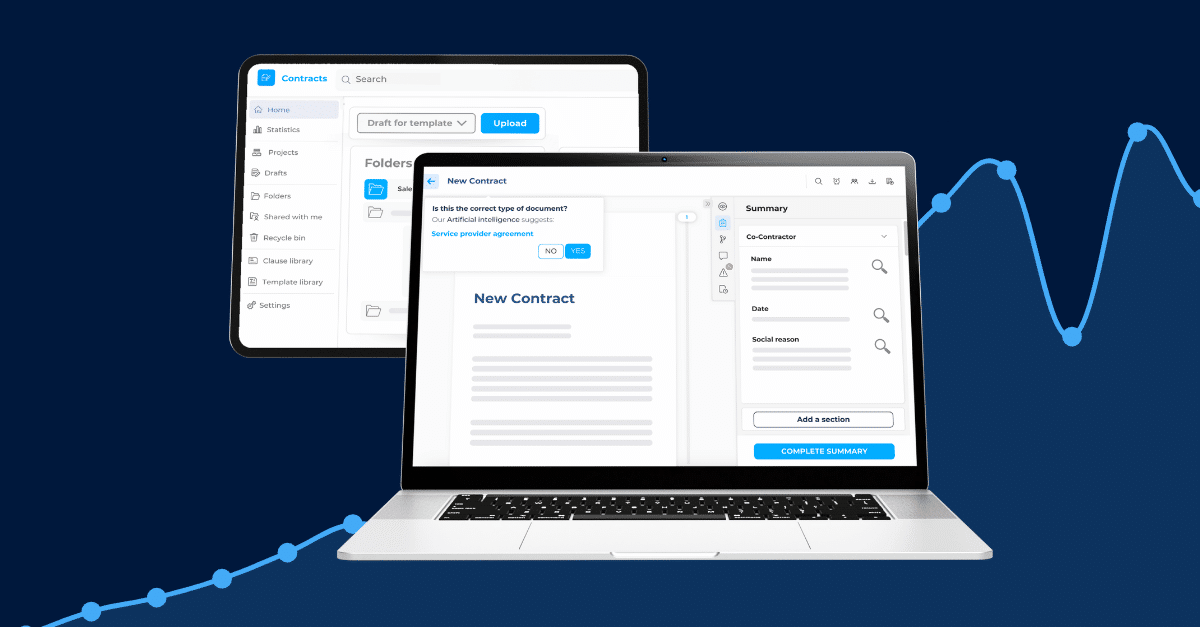Contract automation uses specialized software to digitize and streamline the entire contract lifecycle, from creation to renewal. By automating manual tasks, it accelerates deal closures, reduces errors, ensures compliance, and provides real-time visibility into contract status. Key features include template libraries, workflow automation, AI-powered analysis, and seamless integration with business systems. Successful implementation requires careful process assessment, strategic planning, and user adoption. As AI and blockchain advance, contract automation is set to deliver even greater efficiency, risk reduction, and value for modern businesses.
In today’s fast-moving business environment, legal departments face mounting pressure to deliver more value with fewer resources. Traditional contract management methods—involving manual drafting, physical signatures, and paper filing systems—create bottlenecks that slow down business operations. Contract automation offers a transformative approach to these challenges, enabling organizations to accelerate deal closures while maintaining compliance and reducing risk.
This article explores how contract automation is revolutionizing the way businesses create, manage, and track their contractual agreements, providing insights into implementation strategies and the substantial benefits this technology delivers.
What is contract automation?
Contract automation refers to the use of specialized software to streamline and digitize the entire contract lifecycle—from creation and negotiation to approval, execution, and renewal. Unlike basic contract management, which might simply organize existing documents, contract automation actively transforms the process by reducing manual intervention at each stage.
The evolution from paper-based systems to automated contract solutions represents a significant shift in how legal teams operate. Modern contract automation platforms integrate document generation, workflow management, and analytics capabilities into a centralized system that serves as a single source of truth for all contract-related activities.
Benefits of implementing contract automation
Organizations implementing contract automation experience numerous advantages that directly impact their bottom line and operational efficiency.
Time and cost efficiency
Contract automation significantly reduces the time required to create, review, and execute agreements. By automating routine tasks such as document generation and approval routing, businesses accelerate their contract cycles by up to 50%. This efficiency translates into faster deal closures and reduced operational costs.
Enhanced accuracy and compliance
Manual contract processes are prone to errors that create legal and financial risks. Automated systems ensure consistency by using pre-approved templates and clauses, reducing the likelihood of mistakes. Additionally, these platforms track regulatory requirements and flag potential compliance issues before they become problems.
Improved visibility and control
Contract automation provides comprehensive visibility into the status and performance of all agreements. Teams gain access to real-time information about contract milestones, obligations, and renewal dates. This transparency enables proactive management of contractual relationships and prevents missed deadlines or opportunities.
Essential features of contract automation software
When evaluating contract automation solutions, businesses should look for platforms that offer comprehensive functionality across the entire contract lifecycle.
Template and clause libraries
Effective contract automation begins with a robust library of templates and clauses that reflect company standards and best practices. These pre-approved elements enable rapid document creation while ensuring compliance with legal requirements and business policies.
Workflow automation
Advanced contract automation platforms include configurable workflows that route documents to appropriate stakeholders for review and approval. These automated processes eliminate manual handoffs, reduce bottlenecks, and provide visibility into the status of each contract.
AI-Powered contract analysis
Artificial intelligence capabilities transform contract management by automatically extracting key information, identifying risks, and comparing language against company standards. AI tools analyze contracts faster and more consistently than human reviewers, flagging potential issues for legal team attention.
Integration capabilities
The most effective contract automation solutions integrate seamlessly with existing business systems such as CRM platforms, financial software, and electronic signature tools. These integrations create a connected ecosystem that shares information across departments and eliminates duplicate data entry.
How to successfully implement contract automation
Implementing contract automation requires careful planning and a strategic approach to ensure adoption and maximize return on investment.
Assess current contract processes
Before selecting a solution, organizations should thoroughly analyze their existing contract processes to identify pain points, inefficiencies, and specific requirements. This assessment provides the foundation for selecting appropriate technology and designing optimized workflows.
Select the right solution
When choosing a contract automation platform, consider factors such as security features, scalability, ease of use, and integration capabilities. The ideal solution balances comprehensive functionality with user-friendly design to encourage adoption across the organization.
Develop an implementation strategy
A successful implementation requires clear objectives, defined metrics for success, and a phased approach that prioritizes high-impact areas. Organizations should allocate adequate resources for configuration, data migration, and training to ensure a smooth transition.
Promote user adoption
Technology alone cannot transform contract processes—people must embrace the new system for it to deliver value. Provide comprehensive training, create detailed documentation, and highlight early wins to build momentum and support for the new platform.
Overcoming common challenges
While contract automation offers substantial benefits, organizations often encounter challenges during implementation and adoption.
Managing complex approval workflows
Many organizations have intricate approval processes involving multiple departments and conditional routing. Addressing this complexity requires careful workflow mapping and configuration to ensure the automated system accurately reflects necessary approval chains.
Ensuring data security
Contracts contain sensitive information that requires protection. Organizations must evaluate security measures including encryption, access controls, and compliance with standards such as ISO 27001 to safeguard confidential data.
Handling exceptions
Not all contracts follow standard processes, and automation systems must accommodate exceptions without creating new inefficiencies. Flexible platforms allow for customization while maintaining the benefits of standardization where appropriate.
The future of contract automation
The contract automation landscape continues to evolve, with several emerging trends shaping its future development.
Advanced AI applications
Artificial intelligence capabilities are expanding beyond basic contract analysis to include predictive insights about contract performance, negotiation guidance, and automated risk assessment. These advanced applications will further reduce manual effort while improving contract outcomes.
Blockchain integration
Blockchain technology offers potential for immutable contract records and automated execution through smart contracts. Though still emerging in mainstream business applications, blockchain represents a significant opportunity for enhancing contract security and automation.
Expanded self-service capabilities
Future contract automation platforms will likely offer enhanced self-service options that allow business users to generate standard agreements without legal department involvement. These capabilities will free legal teams to focus on complex, high-value contracts while maintaining appropriate oversight.
Transforming contract management through automation
Contract automation represents a strategic investment that delivers both immediate efficiencies and long-term competitive advantages. By reducing manual effort, minimizing risks, and accelerating contract cycles, automated solutions enable legal teams to transition from administrative functions to strategic business partners. Organizations that successfully implement contract automation gain more than operational improvements—they create a foundation for data-driven decision making and proactive contract management that supports broader business objectives. As technology continues to advance, the gap between automated and manual contract processes will only widen, making this transformation increasingly essential for business success.
For businesses ready to explore contract automation, the first step is evaluating current processes and identifying opportunities where technology can deliver the greatest impact. With the right approach and solution, contract automation becomes a powerful tool for driving efficiency, reducing risk, and supporting growth across the organization.
To see how leading organizations are already leveraging contract automation to streamline legal operations, explore the success story of Ottakringer Getränke AG, which used the DiliTrust Suite to centralize contracts and accelerate approval processes.




